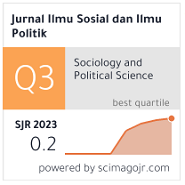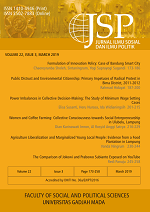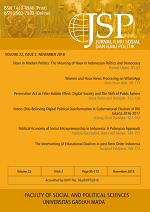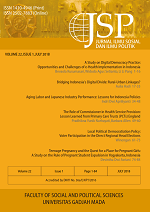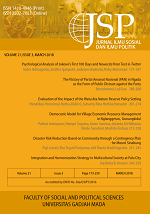Non-Muslim Voices on Halal Certification: From Sectoral-Religious Tendencies to State-Mandated Regulations
B.J. Sujibto(1*), Fakhruddin M(2)
(1) Faculty of Social Sciences and Humanities, UIN Sunan Kalijaga Yogyakarta, Indonesia
(2) Badan Riset dan Inovasi Nasional (BRIN), Indonesia
(*) Corresponding Author
Abstract
In recent years, halal food and products have been expanding into the global economy, and today's halal market is estimated around USD 2.4 trillion globally. This article discusses the understanding and articulation of halalness and halal certification among non-Muslim business communities in Indonesia, focusing on owners of small and medium enterprises (SMEs). Their voices need to be heard and responded to, especially by government agencies. Since the non- Muslim communities’ understanding of halalness is mostly based on their life experiences, it could be treated as empirical data to inform policy-making. Meanwhile, the government has issued Halal Product Assurance (JPH) Law 33/2014, which mandated the establishment of the Halal Product Assurance Organizing Agency (BPJPH). The enforcement of JPH Law is an attempt to strengthen the BPJPH’s position, but it faces challenges and conflicts of interest in politics and business. Using a qualitative approach to collect data from non-Muslim SME business players in Yogyakarta and Semarang, this study found that the articulation and understanding of halalness are narrowly sectoral, religious, and ideological. Rather than halal certification, the Indonesian Food and Drug Authority (BPOM) has become a more trusted certification. Therefore, the presence of the state is needed to regulate and optimize the fundamental aspects of halal certification, such as hygiene, cleanliness, and health.
Keywords
Full Text:
PDFReferences
Ab Rashid, N., & Bojei, J. (2019). The relationship between halal traceability system adoption and environmental factors on halal food supply chain integrity in Malaysia. Journal of Islamic Marketing, 11(1), 117–142. https:// doi.org/10.1108/JIMA-01-2018-0016
Abdallah, A., Rahem, M. A., & Pasqualone, A. (2021). The multiplicity of halal standards: a case study of application to slaughterhouses. Journal of Ethnic Foods, 8(1). https://doi. org/10.1186/s42779-021-00084-6
Abdul, M. (2014). Perceptions on Halal food certification in Hat Yai, Thailand. International Journal of Economics and Management, 8(1), 178–194.
Akhlas, A. W. (2020, September 21). Halal certification should not be burdensome for businesses: Sri Mulyani. The Jakarta Post. https://www.thejakartapost.com/news/2020/09/21/halal-certification- should-not-be-burdensome-for- businesses-sri-mulyani.html
Akhtar, N., Jin, S., Alvi, T. H., & Siddiqi, U. I. (2020). Conflicting halal attributes at halal restaurants and consumers’ responses: The moderating role of religiosity. Journal of Hospitality and Tourism Management, 45 (August), 499–510. https://doi. org/10.1016/j.jhtm.2020.10.010
Al-Kwifi, O. S., Abu Farha, A., & Ahmed, Z. U. (2019). Dynamics of Muslim consumers’ behavior toward Halal products: Exploration study using fMRI technology. International Journal of Emerging Markets, 14(4), 689–708. https://doi.org/10.1108/IJOEM-11-2017-0486
Alasuutari., P., Bickman, L., & Brannen, J. (2008). The SAGE Handbook of Social Research Methods. In P. Alasuutari, L. Bickman, & J. Brannen (Eds.), The SAGE Handbook of Social Research Methods (pp. 1–631). SAGE Publications.
Ali, A., Ali, A., & Sherwani, M. (2017). Shaping Halal Into a Brand? Factors Affecting Consumers’ Halal Brand Purchase Intention. Journal of International Food and Agribusiness Marketing, 29(3), 234–259. https://doi.org/10 .1080/08974438.2017.1312657
Annabi, C. A., & Ibidapo-Obe, O. O. (2017). Halal certification organizations in the United Kingdom: An exploration of halal cosmetic certification. Journal of Islamic Marketing, 8(1), 107–126. https://doi. org/10.1108/JIMA-06-2015-0045
Ayyub, R. M. (2015). Exploring perceptions of non-Muslims towards Halal foods in UK. British Food Journal, Vol. 117 I, 2328–2343. https://doi.org/10.1108/BFJ-07-2014-0257
Aziz, Y. A., & Chok, N. V. (2013). The Role of Halal Awareness, Halal Certification, and Marketing Components in Determining Halal Purchase Intention Among Non- Muslims in Malaysia: A Structural Equation Modeling Approach. Journal of International Food and Agribusiness Marketing, 25(1), 1–23. https://doi.org/10.1080/08974438.2013.723997
Billah, A., Rahman, M. A., & Hossain, M. T. Bin. (2020). Factors influencing Muslim and non-Muslim consumers’ consumption behavior: A case study on halal food. Journal of Foodservice Business Research, 23(4), 324–349. https://doi.org/10.1080/15378020.2020.1768040
Borzooei, M., & Asgari, M. (2013). The Halal Brand Personality and its Effect on Purchase Intention. Interdisciplinary Journal of Contemporary Research in Business, 5(3), 481. http://journal-archieves34.webs. com/481-491.pdf
Carter, M. J., & Fuller, C. (2015). Symbolic interactionism. Sociopedia, May 2016. https://doi.org/10.1177/205684601561
Chamberlain-Salaun, J., Mills, J., & Usher, K. (2013). Linking symbolic interactionism and grounded theory methods in a research design: From Corbin and Strauss’ assumptions to action. SAGE Open, 3(3). https://doi.org/10.1177/2158244013505757
Depari, C. D. A., & Setiadi, A. (2014). Makna Ruang Kampung Kauman Yogyakarta dan Semarang Berdasar Konsep Relasi dalam Pandangan Jawa. Jurnal Tataloka, 16 (3), 133. https://doi.org/10.14710/tataloka.16.3.133-144
Divianjella, M., Muslichah, I., & Ariff, Z. H. A. (2020). Do religiosity and knowledge affect the attitude and intention to use halal cosmetic products? evidence from Indonesia. Asian Journal of Islamic Management (AJIM) . https://doi. org/10.20885/ajim.vol2.iss2.art1
Golnaz, R., Zainalabidin, M., Mad Nasir, S., & Eddie Chiew, F. C. (2010). Non-muslims’ awareness of Halal principles and related food products in Malaysia. International Food Research Journal, 17(3), 667–674.
Hamdani, J., & Wirawan, C. (2012). Open Innovation Implementation to Sustain Indonesian SMEs. Procedia Economics and Finance, 4(Icsmed), 223–233. https://doi. org/10.1016/s2212-5671(12)00337-1
Haque, A., Sarwar, A., Yasmin, F., Tarofder, A. K., & Hossain, M. A. (2015). Non-muslim consumers’ perception toward purchasing halal food products in malaysia. Journal of Islamic Marketing, 6(1), 133–147. https:// doi.org/10.1108/JIMA-04-2014-0033
Hong, M., Sun, S., Beg, R., & Zhou, Z. Y. (2020). Chinese Muslim’s choice of halal products: evidence from stated preference data. Journal of the Asia Pacific Economy, 25(4), 696–717. https://doi.org/10.1080/13547860.2019.1701827
Hosen, N. (2012). Hilal and Halal: How to manage islamic pluralism in Indonesia? Asian Journal of Comparative Law, 7(1), 1–18. https://doi.org/10.1515/1932-0205.1418
Ibrahim, F., & Adinugraha, H. H. (2020). P ers eps i Kons um en No n-M us lim Terhadap Keputusan Pembelian Produk Minuman Halal. Li Falah: Jurnal Studi Ekonomi Dan Bisnis Islam, 5(1), 150. https:// doi.org/10.31332/lifalah.v5i1.1692
Ismail, F. R. H., & Nasiruddin, K. (2014). Perception of Non-Muslim Consumers towards Halal Products in Malaysia. International Journal of Accounting and Business Management, 2(1), 128–133.
Iswanto, A., & Koeswinarno. (2020). Divergent interpretations and inter-organizational relations of halal product guarantee policy in Indonesia. Jurnal Ilmu Sosial dan Ilmu Politik, 24(1), 67–79. https://doi. org/10.22146/JSP.54282
Jamil, A., Mulyono, A., Fakhruddin, Kustini, Muchtar, Selamet, & Abidin, Z. (2017). Pelaku Usaha dan Regulasi Produk Halal (M. T. Hidayatulloh (Ed.)). LITBANGDIKLAT PRESS.
Jia, X., & Chaozhi, Z. (2021). Turning impediment into attraction: A supplier perspective on Halal food in non-Islamic destinations. Jour nal of De stination Marke ting and Management, 19(135), 100517. https://doi. org/10.1016/j.jdmm.2020.100517
Khalek, A. A., & Ismail, S. H. S. (2015). Why Are We Eating Halal – Using the Theory of Planned Behavior in Predicting Halal Food Consumption among Generation Y in Malaysia. International Journal of Social Science and Humanity, 5(7), 608–612. https://doi.org/10.7763/ijssh.2015.v5.526
Koeswinarno. (2020). Sertifikasi Halal Yes or No. Litbangdiklat Press.
Latif, I. A., Mohamed, Z., Sharifuddin, J., Abdullah, A. M., & Ismail, M. M. (2014). A Comparative Analysis of Global Halal Certification Requirements. Journal of Food Products Marketing, 20(November 2014), 85–101. https://doi.org/10.1080/10454446.2014.921869
Lizardo, O., & Stoltz, D. S. (2018). Max Weber’s ideal versus material interest distinction revisited. European Journal of Social Theory, 21(1), 3–21. https://doi. org/10.1177/1368431017710906
Maksum, I. R., Sri Rahayu, A. Y., & Kusumawardhani, D. (2020). A social enterprise approach to empowering micro, small and medium enterprises (SMEs) in Indonesia. Journal of Open Innovation: Technology, Market, and Complexity, 6(3). https://doi.org/10.3390/JOITMC6030050
Mannaa, M. T. (2020). Halal food in the tourist destination and its importance for Muslim travellers. Current Issues in Tourism, 23(17), 2195–2206. https://doi.org/10.1080/13683500.2019.1616678
Marshall, M. N. (1996). The key informant technique. Family Practice, 13(1), 92–97. https://doi.org/10.1093/fampra/13.1.92
Mathew, V. N., Abdullah, A. M. R. binti A . , & Ismail, S. N. binti M. (2014). Acceptance on Halal Food among Non- Muslim Consumers. Procedia-Social and Behavioral Sciences, 121, 262–271. https:// doi.org/10.1016/j.sbspro.2014.01.1127
Maxwell, J. A. (2013). Qualitative Research Design: An Interactive Approach. SAGE Publications Inc.
Mizuno, Y. (2021, June 16). Politics of Halal certification: the collapse of the MUI’s long- held monopoly. New Mandala. https:// www.newmandala.org/politics-of-halal- certification-the-collapse-of-the-muis- long-held-monopoly/
Mohayidin, M. G., & Kamarulzaman, N. H. (2014). Consumers’ Preferences Toward Attributes of Manufactured Halal Food Products. Journal of International Food and Agribusiness Marketing, 26(2), 125–139. https://doi.org/10.1080/08974438.2012.755720
Mubarok, F. K., & Imam, M. K. (2020). Halal Industry in Indonesia; Challenges and Opportunities. Journal of Digital Marketing and Halal Industry, 2(1), 55. https://doi. org/10.21580/jdmhi.2020.2.1.5856
Nawawi, M. S. A. M., Radzi, C. W. J. W. M., Mamat, M. Z., Hasbullah, M., Mokhtar, M. I., Jenatabadi, H. S., Man, S., Othman, A. H., Azizan, S. A., & Pauzi, N. (2017). Halal Food Industry in Thailand: History, Prospects and Challenges. 1st International Halal Management Conference, August, 302–307.
Nurrachmi, R. (2017). The Global Development of Halal Food Industry: A Survey Halal industry is the latest trend in the world market. Tazkia Islamic Finance and Business Review, 11(1), 41–56.
Rezai, G., Mohamed, Z., & Shamsudin, M. N. (2012). Non-Muslim consumers’ understanding of Halal principles in Malaysia. Journal of Islamic Marketing, 3(1), 35–46. https://doi.org/10.1108/17590831211206572
Riaz, M. N., & Chaudry, M. M. (2004). Halal food production. CRC Press. https://doi.org/10.1201/9780203490082
Suparto, S., D, D., Yuanitasari, D., & Suwandono, A. (2016). Harmonisasi Dan Sinkronisasi Pengaturan Kelembagaan Sertifikasi Halal Terkait Perlindungan Konsumen Muslim Indonesia. Mimbar Hukum - Fakultas Hukum Universitas Gadjah Mada, 28(3), 427. https://doi.org/10.22146/jmh.16674
Thamrin, M., & Virgianita, A. (2018). Strategic Role of Japanese Government in Promoting Halal Market in Japan. The 2nd International Conference on Strategic and Global Studies (ICSGS). https://doi. org/10.4108/eai.24-10-2018.2289667
Tieman, M., & van Nistelrooy, M. (2014). P erception of Malaysian Food Manufacturers Toward Halal Logistics. Journal of International Food and Agribusiness Marketing, 26(3), 218–233. https://doi.org/10.1080/08974438.2013.833572
Tjitroresmi, E., & Suhodo, D. S. (Eds.). (2014). Peluang Usaha Produk Halal di Pasar Global. In Peluang Usaha Produk Halal di Pasar Global. LIPI Press.
Turner, B. S. (2010). Revisiting Weber and Islam. British Journal of Sociology, 61(SUPPL. 1), 161–166. https://doi.org/10.1111/j.1468-4446.2009.01285.x
Weber, M. (2001). The Protestant Ethic and the Spirit of Capitalism (2001st ed.). Routledge.
Westergren, A. (2020). The ascetic twist: Comparing reformation theology and the Byzantine heritage. Studia Theologica-Nordic Journal of Theology, 74(1), 94–129. https://doi.org/10.1080/0039338X.2020.1746397
Wibowo, M. W., & Ahmad, F. S. (2016). Non- Muslim Consumers’ Halal Food Product Acceptance Model. Procedia Economics and Finance, 37(16), 276–283. https://doi.org/10.1016/s2212-5671(16)30125-3
Yamaguchi, H. K. (2019). The Potential and Challenge of Halal Foods in Japan. Journal of Asian Rural Studies, 3(1), 1. https://doi. org/10.20956/jars.v3i1.1712
Article Metrics
Refbacks
- There are currently no refbacks.
Copyright (c) 2023 Jurnal Ilmu Sosial dan Ilmu Politik

This work is licensed under a Creative Commons Attribution-NonCommercial-NoDerivatives 4.0 International License.







